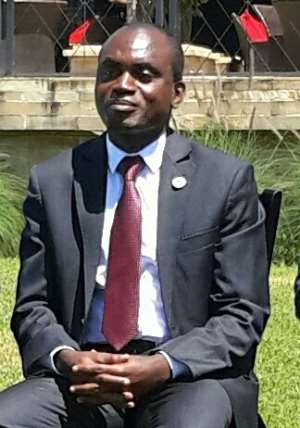
Accra, Aug. 10, CDA Consult – A high powered delegation of the African Court on Human and Peoples’ Rights is to meet President Jose Mario Vaz of the Republic of Guinea Bissau from August 14 to 15, 2017 to hold bilateral consultation. The consultation is expected to pave the way for the country to ratify the Protocol Establishing the African.
Guinea Bissau signed the Protocol establishing the African Court in June 1998 but is yet to ratify the Protocol and deposit the Declaration that allows its citizens and Non-Governmental Organisations access to the African Court.
The African Court delegation will also hold discussion with the country’s Minister of Foreign Affairs, Minister of Justice, the Speaker of Parliament, and Civil Society and Non-Governmental Organisations a statement issued on Thursday by the African Court and copied to CDA Consult in Accra stated.
Justice Sylvain Oré, President of African Court explained that the visit form part of the broader strategy to project the Court to achieve its objectives.
He said there is a need for more countries to ratify the Protocol and deposit the Declaration that allows access to the African Court by Non-Governmental Organizations and individuals.
He said the success of the African Court as a human rights protection mechanism requires much wider ratification of the Protocol by Member States, as well as their acceptance of the competence of the Court by making the Declaration under Article 34(6).
“This universal ratification will give the African Court the legitimacy it needs to effectively discharge its mandate.
“So far, 30 out of 55 AU Member States have ratified the Protocol, and only eight countries have made a declaration under Article 34(6) that allows access to the Court by Non-Governmental Organizations (NGOs) and individuals.
“It is within this framework that since 2010, the African Court has embarked on a sensitization programme, which has enabled it to carry out outreach visits, seminars and conferences at national, regional and continental levels,” Justice Oré said.
He added: “These activities are aimed at enabling the African Court to interact with different actors in order to afford them the opportunity to deepen their understanding of the Court’s mission and possibilities that it offers in terms of human rights protection.’’
The African Court undertook similar sensitizations to the Arab Republic of Egypt and Republic of Tunisia in April this year which resulted in Tunisia depositing a declaration allowing NGOs and individuals to access the Court, whereas Egypt expressed its willingness to work towards the ratification of the Protocol establishing the Court.
The African Court was established by virtue of Article 1 of the Protocol to the African Charter on Human and Peoples’ Rights on the establishment of an African Court on Human and Peoples’ Right to complement the protective mandate of the African Commission on Human and Peoples’ Rights with a view to enhancing the protection of human rights on the continent.
Communication for Development and Advocacy Consult (CDA Consult) provides tailor made development communication tools necessary for operational transformation and translating dreams into achievable goals and equips clients with mechanism for public education on specific issues.
It also provides effective back-up or frontline monitoring and evaluation tools to ensure value for money delivery of projects, whilst providing clients with skills to deliver timely and accurate information on their activities, work, programmes and projects.
CDA Consult is also aimed at building a responsive working culture for corporate growth through a social process at institutional levels based on dialogue using a broad range of tools and methods.
It also assists client to use continuous and adaptive process of gathering, organising and formulating information and data into argument and to communicate to policy-makers through various interpersonal and mass media communication channels.





 Elisu By-election: "If you call yourself a man, boo Chairman Wontumi again" — Bo...
Elisu By-election: "If you call yourself a man, boo Chairman Wontumi again" — Bo...
 Fuel tanker driver escapes with his life after tanker goes up in flames near Suh...
Fuel tanker driver escapes with his life after tanker goes up in flames near Suh...
 Uniform change: ‘Blue and white are brighter colours’ — Kwasi Kwarteng explains ...
Uniform change: ‘Blue and white are brighter colours’ — Kwasi Kwarteng explains ...
 MoE not changing all public basic school uniforms but only newly built ones — Kw...
MoE not changing all public basic school uniforms but only newly built ones — Kw...
 We’re only painting new public basic schools blue and white – Dr. Adutwum clarif...
We’re only painting new public basic schools blue and white – Dr. Adutwum clarif...
 Bawumia has lost confidence in his own govt’s economic credentials – Beatrice An...
Bawumia has lost confidence in his own govt’s economic credentials – Beatrice An...
 I fought WW2 at age 16 – WO1 Hammond shares At Memoir Launch
I fought WW2 at age 16 – WO1 Hammond shares At Memoir Launch
 GRA-SML deal: Regardless of what benefits have been accrued, the contract was aw...
GRA-SML deal: Regardless of what benefits have been accrued, the contract was aw...
 April 26: Cedi sells at GHS13.75 to $1, GHS13.18 on BoG interbank
April 26: Cedi sells at GHS13.75 to $1, GHS13.18 on BoG interbank
 Champion, promote the interest of women if you become Vice President – Prof. Gya...
Champion, promote the interest of women if you become Vice President – Prof. Gya...
